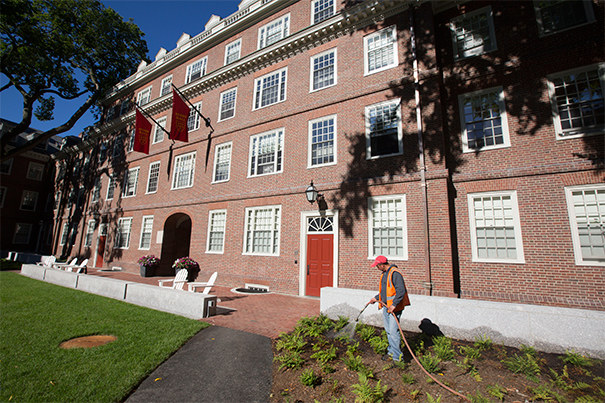
Stone Hall is racking up the accolades. In addition to LEED platinum certification, the preservation of the building’s historical character garnered praise from the Cambridge Historical Commission. The interior (photo 2) is sure to please students, as well — it was transformed to better connect the community and provide updated social and academic spaces.
File photos by Kris Snibbe/Harvard Staff Photographer
Accolade for Stone Hall
Revitalized House wins high honor as LEED-certified building
When Quincy House’s Stone Hall, the first completed project in Harvard College’s House renewal initiative, opened last August, students and the rest of the House community praised the work done to revitalize living and learning spaces. A year later, the accolades continue for Stone Hall: The building recently certified Leadership in Energy & Environmental Design (LEED) platinum, the highest rating in the green-building certification program that recognizes best-in-class construction strategies and practices.
“Stone Hall has made a huge impact on our students. Behind the scenes, we have also maintained, and even strengthened, our commitment to sustainable operations,” said Dean Michael D. Smith of the Faculty of Arts and Sciences (FAS). “Earning LEED platinum certification is a remarkable accomplishment for the renovation of a historic building, and I am incredibly proud of our FAS team for all of their hard work.”
The House renewal initiative ― one of the largest and most ambitious capital initiatives in the College’s history ― seeks to reinvigorate the historic undergraduate House system, enhancing the student experience for generations to come. In addition to creating program and living spaces to meet the changing needs of learning in the 21st century, sustainability is another goal that is helping guide all renewal projects. A University-wide aim to reduce greenhouse gas emissions 30 percent by 2016 and support comprehensive green-building standards drives Harvard’s commitment to building a more sustainable campus.
“The LEED platinum certification is emblematic of the FAS’ strong commitment to reducing greenhouse gas emissions and building healthier, more efficient, and sustainable spaces in which undergraduates can live and learn,” said Jaclyn Olsen, assistant director at the Harvard Office for Sustainability. “This accomplishment wouldn’t have been possible without the continued leadership of Dean Smith and the entire team at the FAS Office of Physical Resources and Planning in the areas of sustainability and reducing greenhouse gas emissions.”
Sustainability improvements included energy-efficiency upgrades to reduce costs and curb greenhouse gas emissions, use of nontoxic building materials and improved lighting, reuse of existing materials when appropriate, and installation of a rainwater harvesting system to reduce irrigation water usage by 61 percent. Similar measures will be an important part of the other House renewal projects now underway and in the future.
Another guiding principle of House renewal — to maintain the Houses’ historical character — has led to further recognition for Stone Hall. The project was honored by the Cambridge Historical Commission as part of its annual Preservation Awards Program for the extraordinary efforts undertaken to conserve and protect Cambridge’s historic architecture.
While the exterior of the building was carefully restored, the interior was transformed to better connect the community and provide updated social and academic spaces. On the lower level, a smart classroom and the Rothenberg Conference Room have hosted classes throughout the academic year, bringing faculty into the House to teach and interact with students. New music practice rooms allow students to pursue their interests, while the Kates/Tobin Community Room has proven to be a popular space for study, as well as for gatherings.
The House Program Planning Committee (HPPC) was created to engage faculty, students, and staff in a yearlong conversation about the mission and purpose of the undergraduate Houses. Students, faculty, administrators, and alumni remain engaged as other renewal projects move forward.
In addition to preserving the historic character of the Houses, the other goals of renewal include invigorating House life, connecting spaces and nurturing community, providing modern accommodations and sustainable operations, and accommodating the future.
Harvard posts case studies, including of Stone Hall, for all of its LEED-certified projects to encourage sharing best practices in green building.




